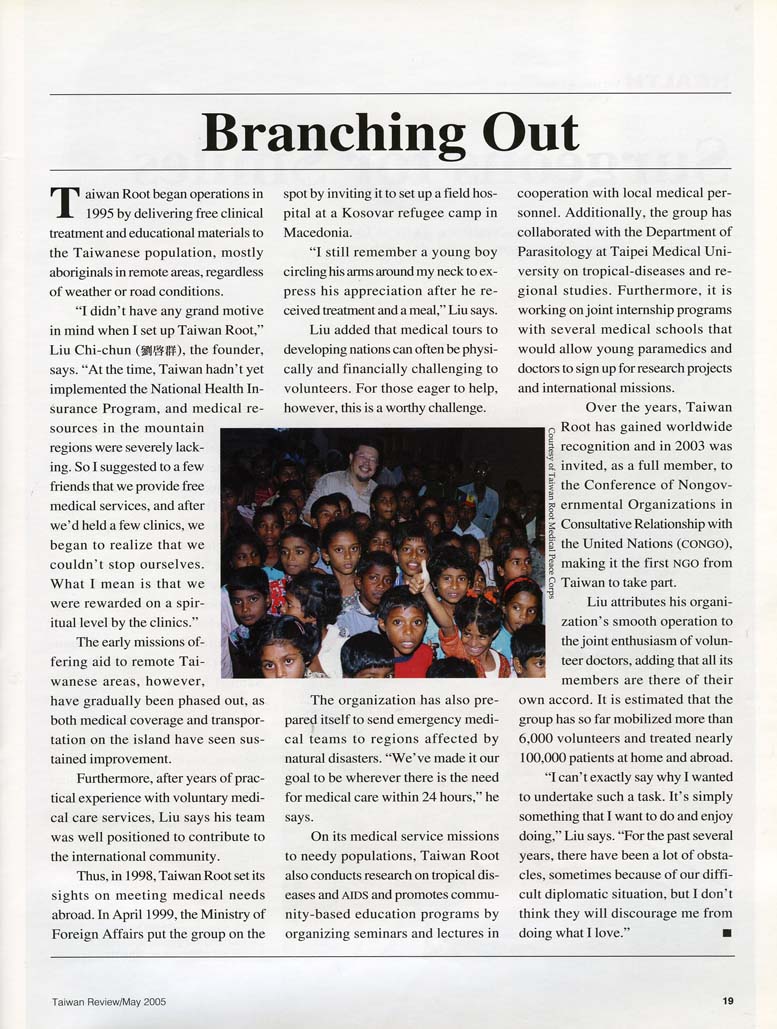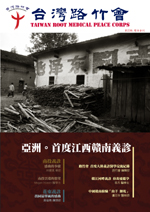
熱門標籤
Page Viewed:14226686
2005 Reported by "Taiwan Review", issued by the Government Information Office, R.O.C
2005 Reported by "Taiwan Review", issued by the Government Information Office, R.O.C
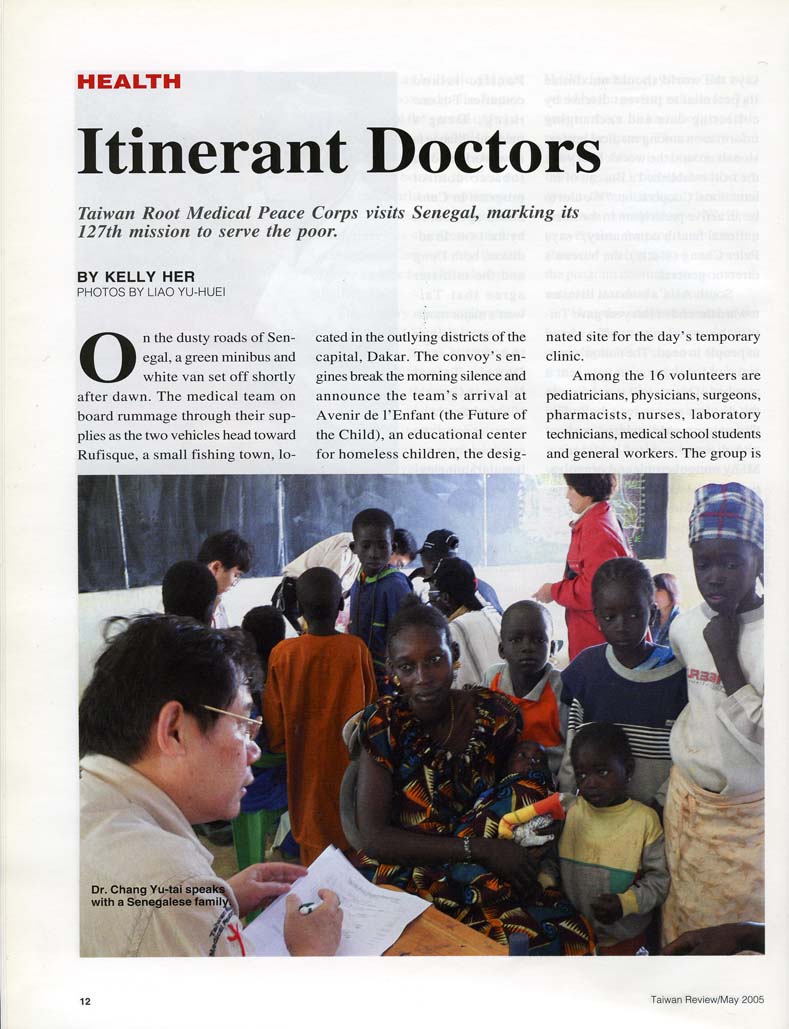
Itinerant Doctors
Taiwan Root Medical Peace Corps visits Senegal, making its 127th mission to serve the poor.
On the dusty roads of Senegal, a green minibus and white van set off shortly after dawn. The medical team on board rummage through their supplies as the two behicles head toward Rufisque, a small fishing town, located in the outlying districts of the capital, Dakar. The convoys engines break the morning silence and announce the team's arrival at Avenir de I'Enfant (the Future of the Child), and educational center for homeless children, the designated site for the day's temporary clinic.
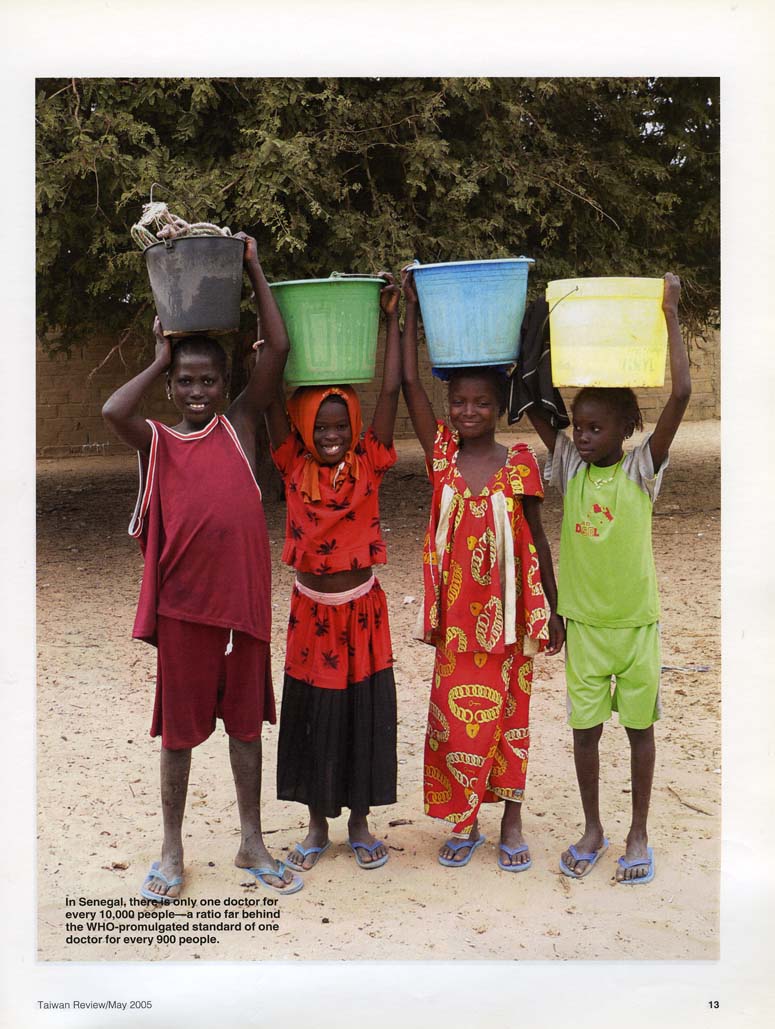
Among the 16 volunteers are pediatricians, physicias, surgeos, pharmacists, nurses, laboratory technicians, medical school students and general workers. The group is excited about setting out on a new mission, despite the fact they just traveled for more than 30 hours to reach the West African nation at their own expense.
While some bustle about unloading their goods, others survey the surroundings and decide how to utilize the space to set up a makeshift clinic. As soon as they finish, a log cue of people is already lined up at the door.
"I just heard that a medical team from Taiwan has come to provide us with free medical services. So, I immediately rushed here with my children." says Amy Ciss, a mother of three. "My youngest child has had diarrhea for days. Thank God you are here."
Ciss "husband is a fisherman. On average, he earns African Financial Community Franc (CFAF) 2,000. or US$4, a day. The treatment for diarrhea, however, costs between CFAF 1,000 to 2,000.
"The medicine is too expensive for us. Sometimes, we have to wait several days until we collect enough money to send our children to the doctor." she says. "The medical center is far from where we live and hard to get to." Ciss' plight is shared by many of the villagers whose meager income comes from fishing, odd construction jobs or hawking.
The 55-year-old Mdiaw Ndoye has been a fisherman for 35 years. "Sometimes, we get nothing from the sea, since we don't have the money to buy equipment to compete with the big ships from other countries that come into our waters," he says. "We spend our money on food, daily goods and education, so we are unable to take care of our own health."
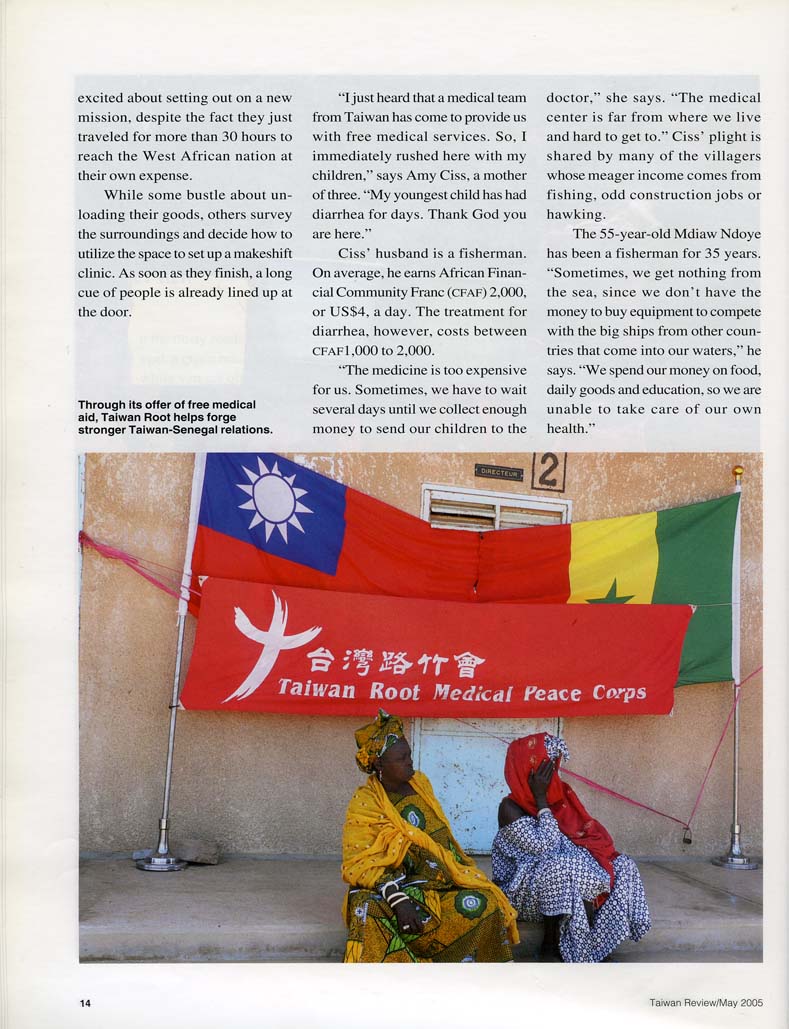
Ndoye comes to the medical station to seek treatment for his leg pain, which has bothered him for two years. He used to relieve the pain by massaging his leg with the powder he makes our of a local plant, or he would go to the beach to put his leg under the sand to warm it up.
"The majority of our people have health problems, like leg or back pain, but they don't have the money to see the doctor. The medical service that you provide is a great help to us, and we're grateful for it. You are doing something really nice, and we'll be praying for all of you."
The dire need for medical assistance in different corners of the world and the rewards that accompany charity work inspired dentist Liu Chi-chun to establish Taiwan Root Medical Peace Corps, a non-governmental organization, in 1995.
Initially, the corps focused on offering monthly free clinics to Taiwan's aboriginal people in villages scattered throughout the mountains. Its first overseas trip was in 1999 when it sent a team of 26 staff to offer medical aid to Kosovar refugees in Macedonia.
Since then the teams have provided free medical care to isolated populations and treated victims of natural disasters in Asia, Africa, the Caribbean and Latin America. "Medical services should transcend national borders and exceed the limitations of politics, race and religion," Liu says. "I hope one day the international community will bring about equitable access to health care for all populations."
Like other less-developed countries, Senegal is in dire need of more facilities and qualified personnel. There are only 17 regional hospitals, with seven located in Dakar, as well as 52 health centers and 900 health stations.
Of its 13,000 villages across the nation, only 2,000 have health stations. Nurses ad midwives from nearby communities operate the stations, and they only treat simple fevers or provide pre-natal care and deliveries.
Senegal has approximately 1,000 doctors, 2,200 nurses and 600 midwives. With a population of 10 million, there is only one doctor for every 10,000 people. The ratio lags far behind the standard of one doctor for every 900 people set by the World Health Organization (WHO).
"There's no hospital here. If we get sick, we need to travel to the city for treatment. The main proble here is the lack of means. I'd say of our 6,000 villagers, 75 percent cannot afford to see a doctor," says Souleymane Ndoye, chief of the Sindou fishing village." All the people livving here are pleased with medical assistance offered by the Taiwanese people. Please come again."
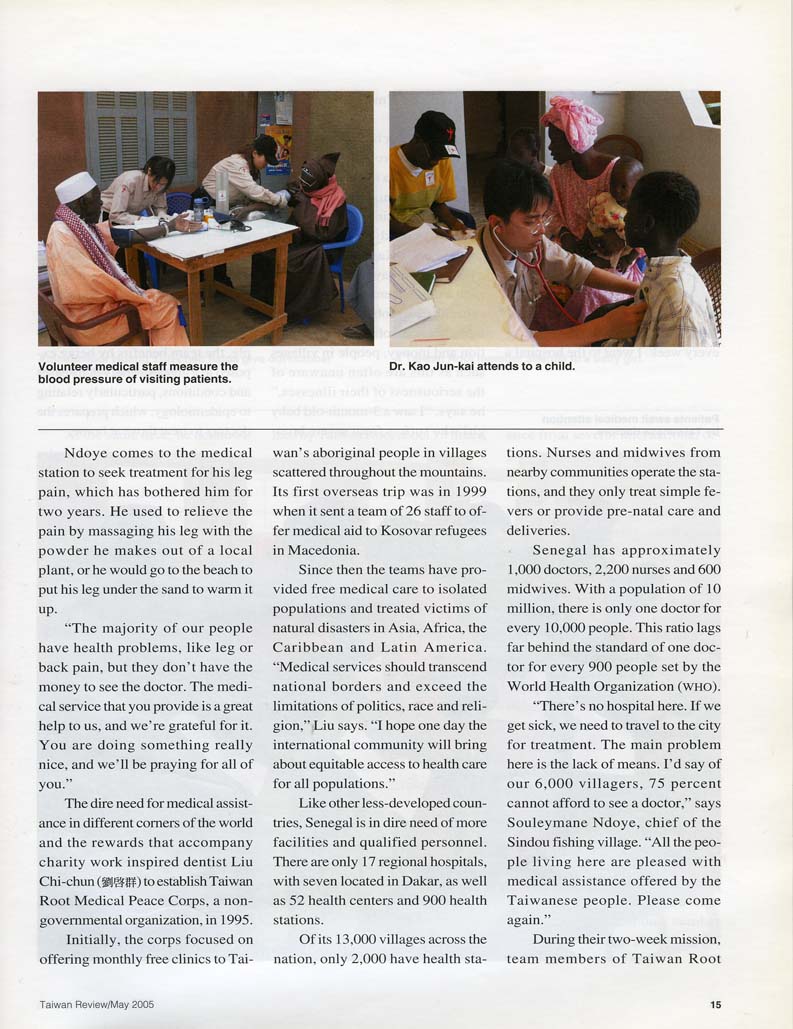
During their two-week mission, team members of Taiwan Root traveled from one village to another. The team frequently sets up a clinic in what appears to be a deserted area, but soon after it is finished , local residents swarm in and line up in long queues.
Among them is the 11-year-old Dieynaba Ba. Barefoot and in need of a new dress, she fidgets and stares at the ground.
"My mother told me to come here to cure my headache,' she says. "I have this problem once or twice every week. I went to the hospital a year ago, and I'm not afraid of the doctor."
Ba has never been to school, and she has seen brothers and sisters. Her father works in the fields. After the doctor examines her and gives her some medicine, she smiles and runs away quickly.
Volunteer Kao Jun-kai, a pediatrician, says participating in such a mission enables him to look at health care problems in a broader light. "Because of the lack of education and money, people in villages such as this are often unaware of the seriousness of their illnesses," he says. "I saw a 3-month-old baby girl who suffers from severe bronchiolities. In her condition, she should have been rushed to the hospital and put in an intensive care unit." Kao was only able to give the girl something to relieve her symptoms, but he told the local nurse that the child should be sent to the hospital imediately.
Kao says cardiac, pulmonary and infectious diseases as well as diarrhea and malnutrition are the most common problems in the region.
In addition to helping local people, the team benefits by being exposed to a greater variety of diseases and conditions, particularly relating to epidemiology, which prepares the doctors to treat those at home.
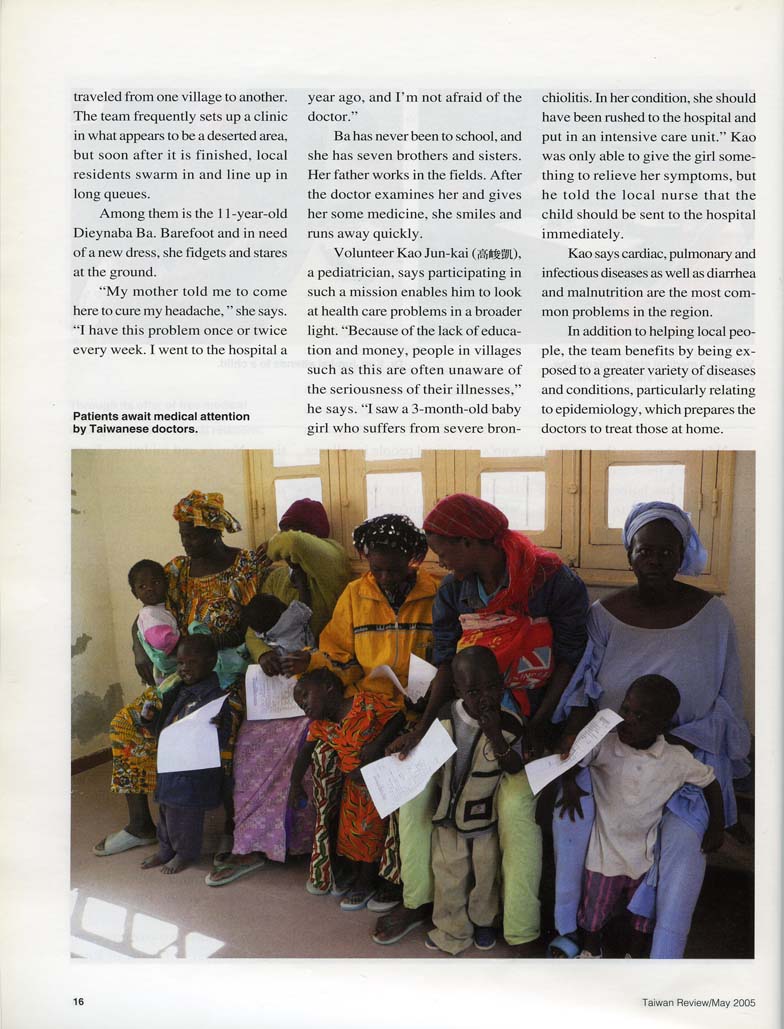
At the same time, he acknowledges the limitations of western medicine in some areas and thinks more attention should be given to traditional therapies, perhaps seeking a combination in the process of treatment, rather than resorting to drugs.
"Learning more about the diseases and sanitary conditions of different countries enables me to know what I can give and what I need to do to improve," he says. "For me, it's a terrific experience to be able to connect with people through my stethoscope."
Kao says it is physically challenging to take on the overseas medical services, given the long hours, as well as the large number of patients who show up to ask for assistance within a short time.
Chang Yu-tai, an associate professor in endocrine and oncologic surgery and emergency room director, has taken part in the international mercy missions organized by Taiwan Root about 15 times, and he too feels rewarded.
"Alghough we only provide short-term services, we do extend our care and give medicine to local residents, who are often thankful for our persence," he says. "Also, by serving in less-developed areas, we are able to study diseases such as malaria and parasitic infections, things that we had previously only seen in textbooks."
Chang plans to submit a proposal to the Department of Health to help set up medical centers in African and South American nations with ties to Taiwan so Taiwanese medical personnel and students have the chance to conduct research while serving local people.
Taiwan Ambassador to Senegal, Huang Yun-chen, says he is touched by Taiwan Root's efforts and points out that the Senegalese trust Taiwan's medical know-how.
"During the 1960s and 70s, Taiwan received considerable assistance from several international organizations, including the WHO, the United Nations Children's Fund and the Rockefeller Foundation to sustain its development," Huag says. "Now that Taiwan is blessed with a robust economy and has achieved a remarkable level of public health, we should repay the international community by assisting Third World countries"
For years, Taiwan has been making an aggressive bid to join the WHO. Taiwan Root's missions, Huang says, are example of Taiwan's ability to play a role in advancing world health.
Moreover, such a move is conducive to the development of Taiwan-Senegal relations. He hopes in the near future more Taiwanese medical groups will follow suit.
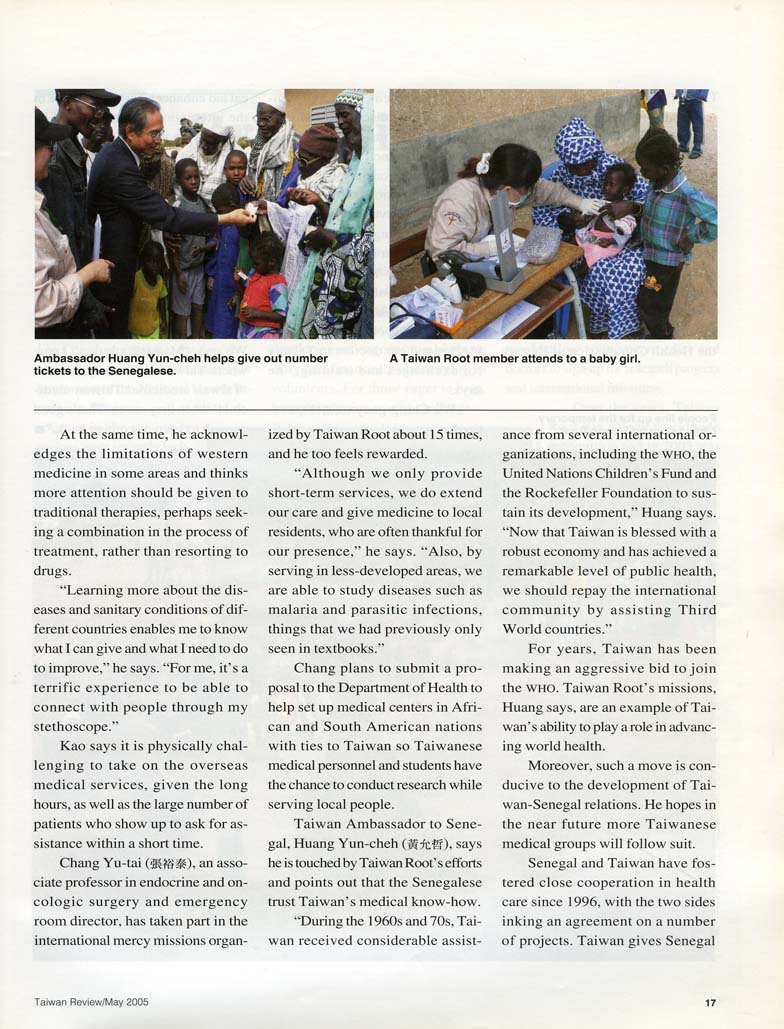
Senegal and Taiwan have fostered close cooperation in health care since 1996, with the two sides inking an agreement on a number of projects. Taiwan gives Senegal US$700,000 a year to help the country build or renovate medical facilities, particularly in rural areas where medical resources are poor.
Huang says the Senegalese government allocated 50 percent of its national budget to education and public health this year. With such as investment, the country's health care should improve markedly, and Huang says the embassy will do what it can to help.
Ibra Gueye, a representative of the Health Commission of Bargny City government, says he is impressed by the discipline and seriousness of the visiting Taiwanese medical personnel.
"Everyone on the medical team is very professional. Most of the places they serve in have no electricity or running water," he says. Gueye adds that he has heard a lot about Senegal-Taiwan cooperation, and he would like to see such efforts continue. "We expect the team to come back, and if it's possible, to send our doctors to Taiwan for exchanges and training," he says.
Wu Ching-guey, a retired nurse, thinks providing medical aid enhances Taiwan's image in the international community. She hopes more medical students can take part in voluntary medical services. To promote this initiative, she intends to write a memoir about overseas medical missions and distribute the book to medical schools.
"We have to finish our work at around 6pm, when it begins to get dark. I hate to have to say 'no' to people who have waited for hours," Wu says. "Many people don't know where Taiwan is, but they call out, "Taiwan medicine! Taiwan medicine!" when they see us. That's good enough to keep us coming back."
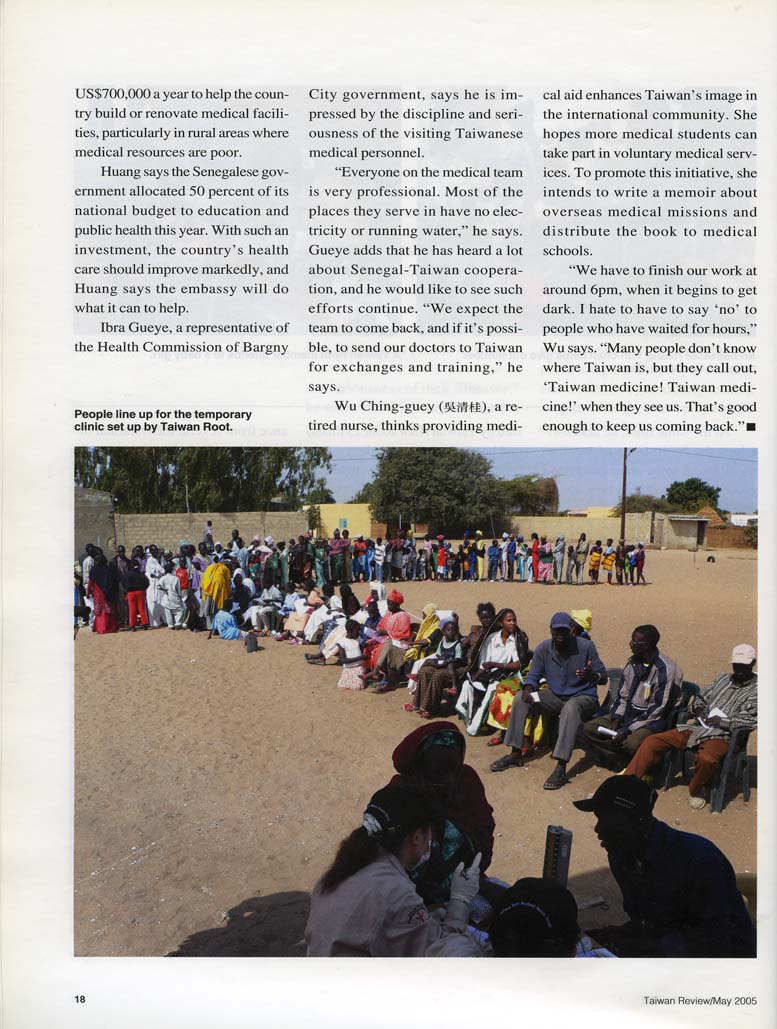
Branching Out
Taiwan Root began operations in 1995 by delivering free clinicl treatment and educational materials to the Taiwanese population, mostly aboriginals in remote areas, regardless of weather or road conditions.
"I didn't have any grand motive in mind when I set up Taiwan Root," Liu Chi-chun, the founder, says, "At the time, Taiwan hadn't yet implemented the National Health Insurance Program, and medical resources in the mountain regions were severely lacking. So I suggested to a few friends that we provide free medical services, and after we'd held a few clinics, we began to realize that we couldn't stop ourselves. What I mean is that we were rewarded on a spiritual level by the clinics."
The early missions offering aid to remote Taiwanese areas, however, have gradually been phased out, as both medical coverage and transportation on the island have seen sustained improvement.
Furthermore, after years of practical experience with voluntary medical care services, Liu says his team waas well positioned to contribute to the international community.
Thus, in 1998, Taiwan Root set its sights on meeting medical needs abroad. In April 1999, the Ministry of Foreign Affairs put the group on the spot by inviting it to set up a field hospital at Kosovar refugee camp in Macedonia.
"I still remember a young boy circling his arms around my neck to express his appreciation after he received treatment and a meal," Liu says.
Liu added that medical tours to developing nations can often be physically and financially challenging to volunteers. For those eager to help, however, this is a worthy challenge.
The organization has also prepared itself to send emergency medical teams to regions affected by natural disasters. "We've made it our goal to be wherever there is the need for medical care within 24 hours," he says.
On its medical service missions to needy populations, Taiwan Root also conducts research on tropical diseases and AIDS and promotes community-based education programs by organizing seminars and lectures in cooperation with local medical personnel. Additionally, the group has collaborated with the Departmet of Parasitology at Taipei Medical University on tropical-diseases and regional studies. Furthermore, it is working on joint internship programs with several medical schools that would allow young paramedics and doctors to sign up for research projects and international missions.
Over the years, Taiwan Root has gained worldwide recognition and in 2003 was invited, as a full member, to the Conference of Nongovernmental Organizations in Consultative Relationship with the United Nations (CONGO), making it the first NGO from Taiwan to tak part.
Liu attributets his orgnization's smooth operation to the joint enthusiasm of volunteer doctors, adding that all its members are there of their own accord. It is estimated that the group has so far mobilized more than 6,000 volunteers and treated nearly 100,000 patients at home and abroad.
"I can't exactly say why I wanted to undertake such a task. It's simply something that I want to do and enjoy doing," Liu says. "For the past several years, there have been a lot of obstacles, sometimes because of our difficult diplomatic situation, but I don't think they will discourage me from doing what I love."
